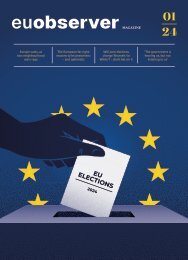20 years of European journalism & history
Twenty years doesn't seem a lot. Certainly not in the light of European history. But while we were writing this magazine for the 20th anniversary of EUobserver, we were surprised just how much happened in the European Union in those two decades.
Twenty years doesn't seem a lot. Certainly not in the light of European history.
But while we were writing this magazine for the 20th anniversary of EUobserver, we were surprised just how much happened in the European Union in those two decades.
You also want an ePaper? Increase the reach of your titles
YUMPU automatically turns print PDFs into web optimized ePapers that Google loves.
From Milošević to<br />
freedom<br />
– and back again<br />
the year<br />
<strong>20</strong>00<br />
Europe's new century began with the peaceful overthrow <strong>of</strong> an old monster,<br />
Slobodan Milošević – but Serbia is less free today than it was before the<br />
revolution, Vesna Pešić said.<br />
By Andrew Rettman<br />
Europe's new century began with the peaceful<br />
overthrow <strong>of</strong> an old monster: the late Serbian<br />
dictator Slobodan Milošević.<br />
people entered the parliament building," she said.<br />
"I felt very proud," she added.<br />
It was called the 'Bulldozer Revolution', after a man<br />
drove a bulldozer into Milošević's propaganda HQ, the<br />
radio and TV building in Belgrade, on 5 October <strong>20</strong>00.<br />
"I was scared the military would react, but it didn't.<br />
Somebody did a good job. Thank you, whoever it might<br />
be," Pešić said.<br />
And Serbia's student-led uprising inspired similar ones<br />
in Georgia, Moldova, Ukraine, and even as far afield as<br />
Kyrgyzstan, in the next few <strong>years</strong> to come.<br />
But in <strong>20</strong><strong>20</strong>, Milošević's former propaganda chief,<br />
Aleksandar Vučić, is now sitting in Serbia's presidential<br />
throne.<br />
The revolution's leader, Serbia's late prime minister,<br />
Zoran Đinđić, has been murdered, and most <strong>of</strong> his<br />
former allies live in silence and fear.<br />
And even though Vučić gets red-carpet treatment<br />
in EU capitals, "internally, he looks more like the<br />
Lukashenko <strong>of</strong> Serbia," for Vesna Pešić, a former<br />
Bulldozer Revolution activist, referring to Belarusian<br />
dictator Alexander Lukashenko.<br />
"We had more freedom under Milošević than we do<br />
now," Pešić said.<br />
The 80-year old academic started fighting for human<br />
rights in Serbia back when it was still Yugoslavia in the<br />
1970s.<br />
And on 5 October <strong>20</strong>00, she found herself in a crowd <strong>of</strong><br />
half-a-million people in front <strong>of</strong> the parliament, with no<br />
army or police in sight.<br />
"The whole night was like an anarchic dream,<br />
everybody was free to do whatever they wanted ...<br />
One <strong>of</strong> the people Serbs ought to thank, she said, was<br />
Đinđić.<br />
"He made a deal with the most dangerous elite police<br />
formation [the Red Berets] not to shoot people," Pešić<br />
said.<br />
Another one was the then Russian foreign minister,<br />
Igor Ivanov.<br />
"He [Ivanov] flew to Belgrade on 6 October, went to<br />
Milošević, and told him to recognise that he'd lost<br />
elections. The same day, Milošević went on TV and<br />
said he'd lost," Pešić recalled.<br />
And behind Đinđić and Ivanov, stood the then US<br />
president Bill Clinton, the then-15 EU leaders, and<br />
Russian president Vladimir Putin.<br />
"People were tired <strong>of</strong> Milošević, especially after the<br />
traumatic [Nato] bombardment <strong>of</strong> Serbia, <strong>years</strong> <strong>of</strong><br />
sanctions, poverty, exclusion," she said, referring to<br />
Western reaction to Milošević's bloody 1990s wars.<br />
"All the international forces joined together to help the<br />
Serbian opposition," she said.<br />
Milošević's fall left intact the forces that had kept him in<br />
<strong>of</strong>fice, however.<br />
And at 12.23PM, Brussels time, on 12 March <strong>20</strong>03,<br />
03 — EUOBSERVER ANNIVERSARY <strong>20</strong><strong>20</strong>

















